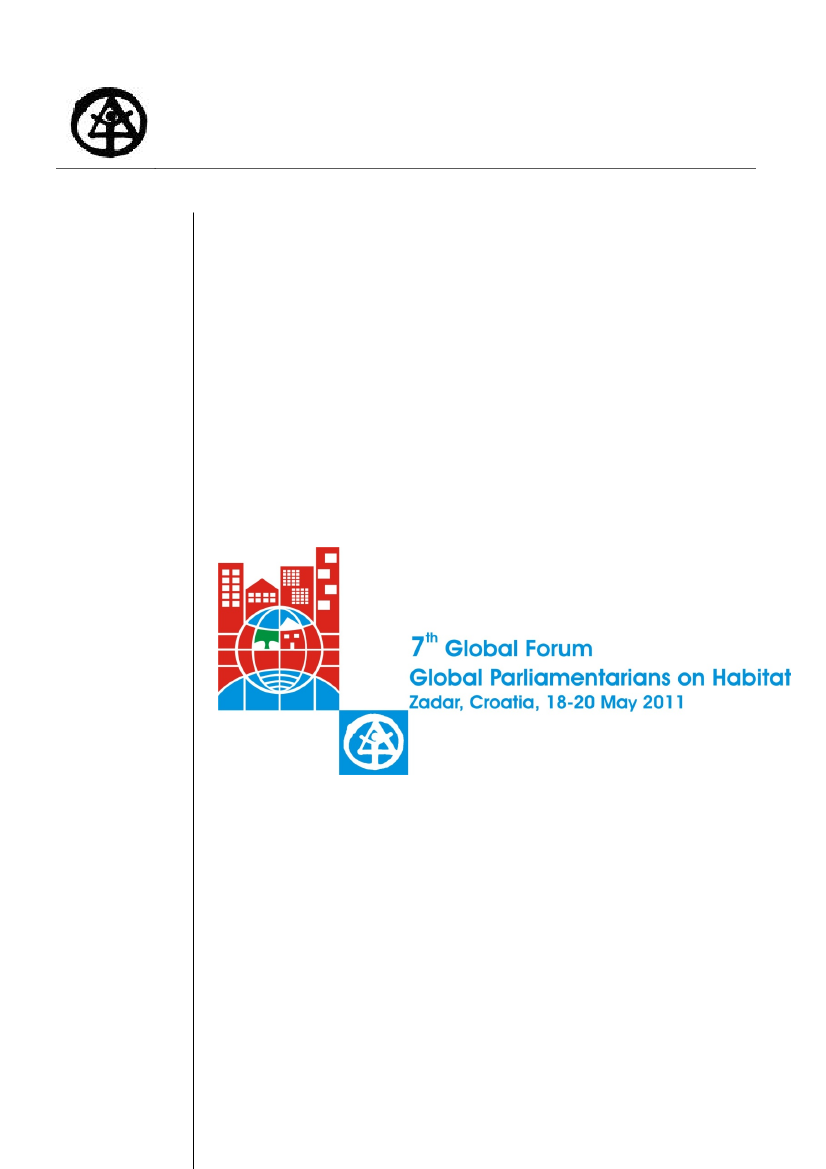Miljø- og Planlægningsudvalget 2010-11 (1. samling)
MPU Alm.del Bilag 728
Offentligt
Global Parliamentarians on
HABITATMay 2011
Peter GötzDeputy of the FederalRepublic of GermanyPresident of the GlobalParliamentarians on Habitat
Minutes
German BundestagPlatz der Republik 111011 BerlinGERMANY
Tel. +49-30-227-74928Fax: +49-30-227-76862
www.goetzpeter.dewww.gph-habitat.de/en
GOOD LAWS FOR A BETTER HABITAT
Wednesday, 18 May 2011On Wednesday, 18 May 2011, the 7thGlobal Forum of the Global Parliamentarians on Habitatwas opened by the following persons:S.E. Luka Bebić,President of the Croatian Parliament (Hrvatski sabor)Hon. Peter Götz,
Member of the German Parliament (Bundestag) and President ofthe Global Parliamentarians on HabitatHon. Jerko Rošin,
Member of the Croatian Parliament (Hrvatski sabor) and President of theEuropean Council of the Global Parliamentarians on Habitat announced the speakers.Prof. Miljenko Domijan,
Main Conservator at the Ministry of Culture, Croatia, presented theCity of Zadar and Croatia to the participants.The opening ceremony was followed by a Reception at which the participants received a firstopportunity to get to know each other.
Thursday, 19 May 20111. Welcome
Hon. Peter Götz,
President of the Global Parliamentarians on Habitat opened the 7thGlobalForum of the Global Parliamentarians on Habitat and welcomed all the parliamentarians toZadar.The agenda of the Forum was unanimously adopted by the participants.Hon. Jerko Rošin,
President of the European Council of the Global Parliamentarians on waschosen to chair the Board of the day. He was assisted in his function by the other members ofthe Board, namelyHon. Peter Götz,
President of the Global Parliamentarians on Habitat,Senator Ricardo Fidel Pacheco Rodriguez,
President of the GPH Americas,Mr. Ronald
Kiandee,
President of the GPH Asia,Mr. Alhatih Mohamed Saeed,
Vice-President of the GPHAfrica andOscar López Velarde Vega,
Alternate President of the Advisory Council of the GPH.Mr. Dražen Grgurović,Deputy Mayor of the City of Zadar which hosted of the forum welcomedthe participants to his City and presented the visions for the future development of Zadar andthe University of Zadar.Prof. Dr. Ante Uglešić,Rector of the Zadar University at which location the Forum was held,welcomed the parliamantarians to his University.
2. Reports
The regional Presidents of the GPH reported on the activities in their regions.In the morning of the 18thof May 2011, Regional Forums of the GPH Africa, Americas, Asia andEurope were held. Elections of a new Board of Directors were held both in the Asian andEuropean Forums.Mr. Ronald Kiandee,
Deputy Speaker of the House of Representatives ofMalysia, was elected President for Asia andHon. Jerko Rošin,
Member of Parliament fromCroatia, was elected President for Europe.Page 2 of 63. Workshops
The workshops were introduced by:Hon. Luka Denona,
Vice-President of the Parliamentary Committee for SpatialDevelopment and Construction of the Croatian Parliament, Zagreb, CroatiaMrs. Nike Sudarević,State Secretary at the Ministry of Environmental Protection,Physical Planning and Construction, Zagreb, CroatiaThe participants were then asked to join the debate in one of two workshops.3.1. Workshop 1: Legislators as Drivers of Change
This workshop was moderated bySenator Ricardo Fidel Pacheco Rodríguez,
President ofthe GPH Americas.The workshop was introduced by the expertProf. Luigi Fusco Girard
of the Università deglistudi di Napoli Federico II, Naples, Italy.The panel discussion was led by:Prof. Petar Filipić,Faculty of Economy, Split, CroatiaMs. Maja Markovčić Kostelac, Acting Director,Ministry of Sea, Transport andInfrastructure, Zagreb, CroatiaDr. Alexander Röder,
International Expert in Climate Change and Sustainability,Germany and CroatiaDr. Markandey Rai,
Chief, Global Parliamentarians & Trade Unions UN-HABITAT,Nairobi, KenyaIn the ensuing discussion, the following remarks were made:- Law-making needs to be approached multi-disciplinary way. In order to draft good laws, weshould not focus only on economic aspects , but on civic and cultural factors. This can beachieved by increasing the participation in the law-making process. This will result in better andmore inclusive laws.- In practice, by focussing only on economic aspects, social issues are not addressed. Thisleads to inequalities such as the creation of slums. We need political intervention.- Housing is a fundamental right. Besides four walls and a roof over ones head, it should includethings such as electricity, water and sanitation. Parliamentarians should work hard towardsproviding this to their people.- Good laws should focus on improving the lives of especially the marginalised people, such asslumdwellers.- We need realistic laws that are easy to implement. We need to follow up on whether theselaws are implemented. We need to talk less and do more.- We should make laws that are implementable everywhere. We need a globally implementablelegislation.- We must share our legislations for best governance. We will only achieve sustainability if wecombine our knowledge.Page 3 of 6
- We should experiment in pilot projects to assess what works and we should share the results.- The GPH have an important role to play in UN-HABITAT. We believe that the GPH should beinvited to participate in the management and governance of UN-HABITAT.- To achieve all these goals, a strong political will is required.
3.2. Workshop 2: Coastal Cities and Climate Change
This workshop was moderated byHon. Jerko Rošin,
President of the GPH Europe.The workshop was introduced by the expertMr. Stjepo Butijer,
President of the SpatialPlanning Council of Croatia.The panel discussion was led by:Prof. Miljenko Domijan,
Main Conservator at the Ministry of Culture, Zagreb, CroatiaMr. Ivica Trumbić,United Nations Environment Program (UNEP)/Mediterranean ActionPlan (MAP), Global Environment Facility (GEF), Croatia/GreeceMr. Pablo Vaggione,
International Urban Development Consultant, Madrid, SpainProf. Eugenie L. Birch,
Lawrence C. Nussdorf Professor, Pennsylvania, USAIn the intense discussion which followed, the following points were emphasized:- Parliamentarians are aware that the rise of the sea level is one of the most severe climaticproblems of today. This problem will be even worse in our near future unless we act. Rise of thesea level is one of the burning issues which coastal areas must face. It is critical that effectivemitigating measures for resolving this problem are found.- Problems of climate change should be answered both on national as well on local level. Weemphasize that local level has a key role in dealing with climate change. In addition, it isnecessary to create synergies between the different levels of governance.- Historical continuity of urbanism and urban culture as a framework for present and futureactions is extremely important in some cases.- Definition of coastal cities, one that identifies key elements which distinction coastal cities fromothers, has not yet been found. Therefore, it would be beneficial to continue this discussion inthe future.- On the issue of big cities, it is clear that they generate big problems, but big cities have alsogot the capacity to solve them.- We must emphasize that mechanisms of the past are not suitable for solving present, let alonefuture problems. Parliamentarians should seek new mechanism adapt for the 21stcentury andthey should embrace the integrated approach- Cooperation between parliamentarians, public sector and universities is crucial in order torespond to problems of climate change.- Problems of small, closed seas are not quite the same as the problems of open seas, but ourcommon ecological problem is the evident rise of the sea level.- All of us should be aware and take measures in order to deal with ecologically inducedmigrations.
Page 4 of 6
- GPH can act as a driver behind good initiatives at parliaments of respective countries;however parliamentarians should be prepared to face the objective financial and technologicalobstacles as they try to launch some initiatives.- Architectural norms are highly important for the preservation of different spaces.- Many coastal areas are endangered not only by the activities happening on the sea, but by theactivities which take place in the hinterlands too.- Children need to be educated about ecological problems at an early age, in their schools, inorder to raise their awareness about the environmental issues. Older generations should bementors and guide the younger ones, in that respect.- One of the ways to implement the principles of Habitat Agenda is to set up national bodieswhich can provide logistical support to the work of GPH in respective countries. Such bodies, asin the case of Croatia, might as well be associated with the Chambers of Architects and/orAssociations of Architects.- 27 principles have been adopted in the previous Declaration of Rio de Janeiro.Parliamentarians recall and acknowledge these principles.After the workshops, the Draft Declaration of Zadar was discussed.
Friday, 20 May 20111. Zadar Declaration
The Draft Declaration of Zadar was discussed by the participants.The Delegation of Iran, includingHons. Seyed Mohammed Kazem Hejazi
andEng.
Abolghasem Rahmani,
expressed the wish to include a paragraph with the following wordingin the Zadar Declaration:“We support the Palestinians, just like any other nation, for having and enjoying the housing andliving in their own lands and the destruction of their homes is against social and biological rightsdetermined and acknowledged by GPH”.This proposal was rejected by the members of the GPH as well as the Board of Directors of theGPH. The Forums of the GPH are to be used in order to develop solutions to pressing urbanproblems. They are not an arena for extraneous political battles.It was agreed to make a note of this proposal in the minutes of the Global Forum.It was agreed that the Minutes of the Workshops should be included in the Declaration as anaddendum.The Declaration of Zadar was unanimously adopted.
Page 5 of 6
2. Closing
Dr. Markandey Rai,
Chief, Global Parliamentarians and Trade Unions, UN-HABITAT, held aspeech on behalf of Dr. Joan Clos, Executive Director of UN-HABITAT, who had been forced tocancel his participation at short notice due to other urgent commitments.In his closing words,Hon. Peter Götz,
President of the Global Parliamentarians on Habitatthanked the hosts of the 7thGlobal Forum, namely the Croatian Parliament, the City of Zadarand the University of Zadar for their generous hospitality and for the organisation of theconference.After a family photo in front of the main entrance of the historical University of Zadar, theparticipants were invited by the Mayor of the City of Zadar,Mr. Zvonimir Vrančić,to celebratethe successful conclusion of the 7th Global Forum of the Global Parliamentarians on Habitatwith a joint lunch.Page 6 of 6






